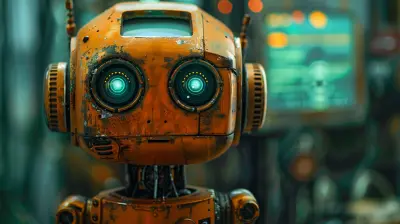AI in Space Exploration: Navigating the Final Frontier
16 December 2024
Space exploration has always been about pushing boundaries—the ultimate quest to explore the unknown. From the first moon landing to the Mars rovers, humanity has continually sought to understand the cosmos. Yet, as we venture further into the vastness of space, the challenges multiply. It's not just about distance or fuel anymore; it's about survival, resource conservation, and making sense of an overwhelming amount of data. Enter Artificial Intelligence (AI), the game-changer that's helping us navigate this final frontier.
In recent years, AI has become an indispensable tool in space exploration. It’s not just the robotic arms and automated spacecraft that depend on it; AI is reshaping how we approach every aspect of space missions. But how exactly is AI transforming space exploration? Let’s dive into the nitty-gritty of what makes this technology the perfect co-pilot for humanity’s journey to the stars.

The Role of AI in Space Exploration
Space is vast, unpredictable, and, let's face it, hostile to human life. We need every tool at our disposal to make sure we can explore it safely and efficiently. And that's where AI steps in.Think of AI as the ultimate Swiss Army knife for space exploration. It can analyze data, solve complex problems, and even make real-time decisions when human intervention is limited—like, say, when you're millions of miles from Earth. But what does that mean in practical terms?
Autonomous Spacecraft
Human pilots? Not in deep space. When you’re talking about missions to places like Mars, you can’t rely on human control due to the delay in communication signals that can take anywhere from 6 to 20 minutes to travel between Earth and Mars. That’s where autonomous spacecraft come into play, powered by AI.These spacecraft can make decisions on their own—adjusting their trajectory, avoiding space debris, and even determining when and how to conduct scientific experiments. NASA's Mars rovers, for example, use AI to navigate the rough terrain, deciding which rocks to study and which to avoid. The AI basically acts like a highly-skilled scout, making choices based on real-time data without waiting for Earth-bound scientists to weigh in.
Data Analysis and Insights
Space missions generate a mind-boggling amount of data. Think about it: just one satellite can capture terabytes of information every single day. Now multiply that by the number of active satellites out there and you're looking at an astronomical (pun intended) amount of data. Sorting through all that manually? Not gonna happen.This is where AI swoops in like a superhero. Machine learning algorithms can sift through massive datasets, looking for patterns and insights that would be impossible for a human to catch. Whether it’s detecting the presence of water on distant planets or analyzing atmospheric conditions, AI can process data at lightning speed, offering insights that could take human scientists years to uncover.
AI Astronaut Assistants
Imagine being a lonely astronaut on a long-haul mission to Mars. You’re stuck in a tin can for months with only your crewmates for company. Sounds rough, right? Enter AI assistants, the space-age equivalent of Siri or Alexa, but way smarter.Think of them as your cosmic sidekick. These AI-driven assistants can monitor the spacecraft’s systems, help with repairs, and even provide emotional support (because, yeah, space can get kind of lonely). They also assist astronauts in performing complex tasks, such as conducting scientific experiments or making critical flight decisions.
IBM’s Watson, for instance, has been integrated into some space missions to help astronauts analyze data in real-time, troubleshoot issues, and even communicate findings back to Earth. AI assistants are essentially the unsung heroes behind the scenes, keeping everything running smoothly.

AI and Space Robotics: The Perfect Partnership
Let’s face it: sending humans into deep space is risky, expensive, and logistically challenging. So, what’s the alternative? Robots. But not just any robots—AI-powered robots.AI-Powered Rovers
We’ve already got robots roving around Mars, and AI is what makes them so effective. NASA’s Curiosity, Perseverance, and even the upcoming Mars Sample Return Mission rely heavily on AI to navigate terrains, conduct experiments, and transmit findings. These machines are like the ultimate space explorers—able to go where no human can (at least, not yet).But it’s not just about exploration. AI-powered robots can also work on space stations, handling repairs, and maintenance tasks that would be too dangerous or tedious for human astronauts. They can perform complex procedures like assembling new modules or fixing broken equipment, all while learning from their experiences.
AI-Driven Drones and Satellites
Beyond rovers, AI has also found its way into drones and satellites. NASA’s Dragonfly mission, aimed at exploring Saturn’s moon, Titan, will use an AI-powered drone to fly between different locations, conducting scientific experiments on the go. AI allows these drones to make quick decisions, like where to land or which samples to collect, without constant human oversight.Satellites, too, are becoming increasingly autonomous, thanks to AI. They can adjust their orbits and avoid collisions with space debris, all while collecting and analyzing data. AI makes them more efficient, reducing the number of ground-based operators needed to manage multiple satellites simultaneously.

AI’s Role in Tackling Space Hazards
Space isn’t just about pretty stars and distant planets. It’s also full of hazards—cosmic radiation, space debris, and unpredictable weather patterns, to name a few. AI is becoming crucial in addressing these challenges.Space Debris Management
Space is cluttered. Decades of space exploration have left thousands of pieces of debris orbiting Earth. From defunct satellites to random bits of metal, this debris poses a significant threat to active spacecraft and space stations. AI is now being used to track and predict the trajectories of these objects, enabling spacecraft to take evasive action when necessary.AI algorithms can predict collisions and even suggest the most efficient maneuvers to avoid them, reducing the risk of damage to critical space infrastructure. Think of it as AI playing traffic cop in the busiest highway imaginable.
Space Weather Forecasting
Space weather—think solar flares and cosmic radiation—can wreak havoc on technology, both in space and on Earth. AI is helping scientists predict these events more accurately, allowing space missions to take precautionary measures.By analyzing vast amounts of data from solar observatories and other monitoring stations, AI can forecast solar storms and radiation bursts, giving spacecraft time to shield themselves from potentially catastrophic damage. It’s like having a weather app for space, only a lot more complicated and way more important.

The Future of AI in Space Exploration
AI’s role in space exploration is only going to grow. As we set our sights on more ambitious missions—like sending humans to Mars or establishing lunar colonies—AI will be essential for solving the complex logistical and scientific problems that come with these ventures.AI in Colonization Efforts
If humanity is ever going to colonize distant planets, AI will be leading the charge. From scouting potential landing sites to managing life support systems, AI will be at the heart of these efforts. Imagine AI systems that can oversee the building of habitats on Mars, ensuring they are safe, efficient, and sustainable.AI could also help manage the food and water supply in these colonies, using machine learning to optimize the use of limited resources. It’s not a stretch to say that future Martian colonies could be run largely by AI, reducing the need for constant human intervention.
AI-Assisted Scientific Discoveries
As we continue to explore the far reaches of our universe, AI will play a key role in helping us answer some of the biggest questions in science. Could there be life on other planets? What can we learn from studying distant galaxies? AI will help us sift through the mountains of data we’ll collect on these missions, potentially uncovering groundbreaking discoveries that could reshape our understanding of the universe.Challenges and Ethical Considerations
While AI in space exploration offers incredible advantages, it also presents unique challenges and ethical questions. The more we rely on AI, the more we need to consider the potential consequences. What happens if an AI system malfunctions in deep space? How do we ensure that these systems are safe and ethical?Moreover, as AI becomes more autonomous, we need to think about the role humans play in these missions. Will we reach a point where AI is making decisions that are too complex for humans to understand? And if so, how do we maintain oversight in these situations?
While AI offers incredible promise, it’s crucial that we continue to ask these questions as we push forward into the cosmos.
Conclusion: The AI Frontier
AI is transforming space exploration in ways that were once the stuff of science fiction. From autonomous spacecraft to AI-powered robots and beyond, this technology is making it possible for us to explore deeper, faster, and more efficiently than ever before.As we continue to push the boundaries of space exploration, AI will be our most valuable partner, helping us navigate the challenges of the final frontier. Whether it’s managing space debris, making scientific discoveries, or even assisting in colonization efforts, AI is poised to play a starring role in humanity’s cosmic journey.
So, as we reach for the stars, it’s clear that AI will be right there with us—our tireless co-pilot in the vast, mysterious expanse of the universe.
all images in this post were generated using AI tools
Category:
Future TechAuthor:

John Peterson
Discussion
rate this article
18 comments
Briar Jackson
This article highlights the transformative role of AI in space exploration, underscoring its potential to enhance data analysis and automate complex missions. It's a fascinating look at how technology can push the boundaries of our understanding of the universe.
February 1, 2025 at 7:52 PM

John Peterson
Thank you for your insightful comment! I'm glad you found the article engaging and relevant to the exciting advancements in AI and space exploration.
Vesperos Henderson
In the cosmic dance of stars, AI steers our way, Charting realms where silence sings, Unveiling truths in the void's embrace – Exploration's dawn, our dreams take flight.
January 26, 2025 at 1:07 PM

John Peterson
Thank you for your poetic insight! It beautifully captures the essence of AI's role in uncovering the mysteries of space exploration.
Falkor Morrow
Great insights! Expanding on AI's role in real-time data analysis could further illuminate its impact on future space missions.
January 21, 2025 at 11:29 AM

John Peterson
Thank you! I appreciate your feedback and will consider expanding on AI's role in real-time data analysis in future discussions.
Evangeline McClary
Exciting advancements ahead—AI truly revolutionizes space exploration!
January 14, 2025 at 1:18 PM

John Peterson
Thank you! Indeed, AI is set to transform how we explore and understand the universe.
Ruby Russell
AI is revolutionizing space exploration by enhancing data analysis, optimizing navigation, and enabling autonomous decision-making in missions.
January 7, 2025 at 1:49 PM

John Peterson
Thank you! Indeed, AI is transforming space exploration by making missions smarter, safer, and more efficient.
Kova Sharpe
AI isn't just a tool; it's our co-pilot in the cosmos. As we venture into the final frontier, let's hope it doesn't just navigate the stars but also keeps our ambitions grounded in ethical discovery and responsible innovation.
January 3, 2025 at 9:42 PM

John Peterson
Absolutely! AI's role as our co-pilot is crucial for both navigating the cosmos and ensuring our exploration aligns with ethical standards and responsible innovation.
Karina Mathews
Exciting advancements! AI is revolutionizing our exploration of space.
December 29, 2024 at 9:15 PM

John Peterson
Thank you! AI is indeed transforming how we explore the cosmos, making previously impossible missions achievable.
Sari McCarthy
Fascinating exploration of AI's role in space! It’s intriguing to think about how advanced algorithms can enhance our understanding of the cosmos. I'm curious about the potential ethical implications and the future of human-AI collaboration in unraveling the universe's mysteries.
December 26, 2024 at 11:37 AM

John Peterson
Thank you for your insightful comment! The ethical implications and future of human-AI collaboration are indeed critical aspects to consider as we explore the cosmos. Your curiosity highlights an essential dialogue in this exciting field!
Clarissa Franklin
This article beautifully captures the transformative role AI plays in space exploration. It's inspiring to see how technology can enhance our understanding of the universe, pushing the boundaries of what we thought possible. I'm excited for the future, where AI guides us to new discoveries among the stars!
December 23, 2024 at 3:56 AM

John Peterson
Thank you for your thoughtful comment! I'm glad you found the article inspiring and share the excitement for AI's potential in space exploration. The future truly holds limitless possibilities!
Lilith Ramirez
This article insightfully highlights the transformative role of AI in space exploration. As we push the boundaries of human knowledge, it’s crucial to reflect on ethical implications and ensure responsible use of technology in uncharted territories.
December 22, 2024 at 3:38 AM

John Peterson
Thank you for your thoughtful comment! I completely agree—balancing innovation with ethical considerations is essential as we explore the cosmos.
Liv McDaniel
Thank you for this insightful article on the role of AI in space exploration. It's fascinating to see how technology is enhancing our understanding of the universe and improving mission efficiency. I look forward to seeing how AI continues to evolve in this exciting field. Great job!
December 21, 2024 at 1:00 PM

John Peterson
Thank you for your kind words! I'm glad you found the article insightful. Indeed, AI’s role in space exploration is incredibly exciting, and I appreciate your enthusiasm for the future developments!
Kristy Montgomery
Exciting journey ahead! 🚀
December 21, 2024 at 4:38 AM

John Peterson
Thank you! Excited to see where AI takes us in space exploration! 🌌
Mistral Kirk
This article beautifully highlights the transformative role of AI in space exploration. It’s inspiring to see how technology can push the boundaries of human knowledge and capability. I appreciate the insights shared and look forward to witnessing the incredible discoveries that lie ahead in our exploration of the universe!
December 20, 2024 at 5:16 AM

John Peterson
Thank you for your thoughtful comment! I'm glad you found the article inspiring, and I share your excitement for the future of AI in space exploration.
Macey McCarron
In the cosmic dance of stars so bright, AI charts paths through the vast, dark night. Beyond our world, it boldly strives, Unlocking the secrets where the universe thrives.
December 19, 2024 at 8:59 PM

John Peterson
Thank you for your poetic reflection! It beautifully captures the essence of AI's role in uncovering the mysteries of space.
Xeno O'Neal
This article insightfully highlights AI's transformative role in space exploration. It raises important questions about technology's impact on human decision-making and the ethical dimensions of our ventures.
December 18, 2024 at 8:34 PM

John Peterson
Thank you for your insightful comment! I'm glad you found the article highlights important aspects of AI in space exploration and its ethical implications.
Scarlett McNeil
This article beautifully captures the transformative potential of AI in space exploration. The intersection of technology and humanity’s quest for discovery is truly inspiring. As we unlock the mysteries of the universe, it’s heartening to see how innovation continues to push our boundaries. Thank you for sharing!
December 17, 2024 at 1:08 PM

John Peterson
Thank you for your thoughtful comment! I'm glad you found the article inspiring. The intersection of AI and space exploration truly opens up exciting possibilities for our future!
Gunner Willis
AI in space exploration transcends mere technology; it mirrors humanity's quest for understanding. As we navigate the cosmos, AI not only augments our capabilities but also compels us to reflect on our purpose within the universe's vast tapestry.
December 16, 2024 at 9:38 PM

John Peterson
Thank you for your insightful comment! Indeed, AI enhances our exploration efforts while prompting deeper reflections on our existence and purpose in the universe.
Kirk McCallum
As AI transcends earthly boundaries, it challenges our understanding of existence and intelligence, redefining not just exploration, but humanity's place in the cosmos.
December 16, 2024 at 12:14 PM

John Peterson
Absolutely! AI is reshaping our exploration of the cosmos, pushing the boundaries of both technology and our understanding of what it means to be human.
MORE POSTS

Key Trends Shaping the Future of Robotic Process Automation
Wearable Tech for Health: A Review of the Top Fitness Trackers

The Threat of Cyber Espionage: When Hackers Become Spies

The Role of Wearable Tech in Sports Performance Optimization

Why Your Passwords Are Not as Safe as You Think

Eco-Friendly Batteries: A Greener Tomorrow

The Impact of Cryptocurrency on Cross-Border Payments

The Role of Blockchain in Securing Autonomous Vehicle Networks

Testing the Top Noise-Isolating Headphones for Audiophiles

How Big Data is Shaping the Future of E-commerce

Ultrabooks for Content Creators: Performance in a Compact Package